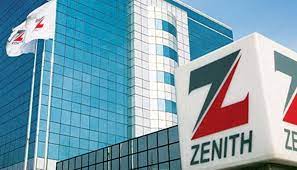Zenith Bank closed 2021 with 6.01 per cent increase in profit after tax to N244.6billion from N230.57 billion reported in 2020 and total dividend of N3.01 per 50 kobo ordinary share but the growing gross earnings and total assets played a critical role in the lender’s performance.
The lender also announced 10 per cent increase in Profit Before Tax (PBT) in 2021 audited result and accounts, driven by substantial increase in the expansion and customers
The group results of Zenith Bank showed that PBT closed 2021 at N280.4billion from N255.9billion reported in 2020.
According to the bank: “The increase in profit before tax was due to growth in the top-line and very strong management of our treasury portfolio that increased efficiency, resulting in a drop in interest expense by 12per cent from N121.1 billion in 2020 to N106.8 billion in the current year.
“This further led to a seven per cent increase in net interest income of N320.8 billion in 2021 from N299.7 billion in 2020.
“This was on the back of 23per cent Year-on-Year (YoY) growth in non-interest income from N251.7billion to N309billion and a two per cent YoY growth in interest income from N420.8billion to N427.6billion.
Zenith bank in 2021 reported 18,698,586 number of customers, a 42 per cent increase from 13,125,135 in 2020. Total number of card issued rose by 34 per cent to 14,743,191 in 2021 from 10,985,869 reported in 2020.
The Group also achieved YoY growth in gross earnings of 10per cent from N696.5 billion reported in the previous year to N765.6billion as non-interest income contributed 44.1 per cent or N337.96billion in 2021 from 39.6 per cent or N275.61billion in 2020.
In the year under review, the management of Zenith Bank proposed a final dividend of N2.80kobo for every share of 50kobo, bringing the total dividend for the financial year ended December 31, 2021 to N3.10kobo.
The lender in 2020 financial year had proposed a final dividend of N2.70 per share which in addition to the N0.30 per share as interim dividend amounts to N3.00 per share (2019: interim dividend of N0.30 per share and a final dividend of N2.50 per share).
The group’s Operating expenses grew by 13per cent YoY but growth remains below the inflation rate. The Group improved its Earnings per Share (EPS) which grew by six per cent from N7.34 to N7.78, however, returns on equity and assets reduced from 22.4per cent to 20.4per cent and from 3.1per cent to 2.7per cent respectively due to the significant growth in the balance sheet.
Balance sheet position
From the balance sheet position, the group’s Total assets increased by 11per cent, growing from N8.48 trillion in 2020 to N9.45 trillion in 2021, mainly driven by growth in customers’ deposits.
With the steady recovery in economic activities, the Group prudently grew its gross loans by 20per cent, from N2.9 trillion in 2020 to N3.5 trillion in 2021. Customer deposits increased by 21per cent, growing from N5.34 trillion in the previous year to N6.47 trillion in the current year.
The bank noted that: “The growth in customer deposits came from both our corporate and retail customers, with retail deposits continuing to grow, up by N146 billion from N1.72 trillion in 2020 to N1.87 trillion in 2021.
“The Group’s continuous drive for retail deposits combined with the strategic rebalancing of its funding base helped to reduce cost of funding from 2.1per cent to 1.5per cent in the current year.”
However, net interest margin declined from 7.9per cent to 6.7per cent in the current year due to lower yields on held-to-maturity (HTM) investment securities.
The group reported moderated Non-Performing Loan (NPL) ratio from 4.29per cent in 2020 to 4.19per cent in 2021. The capital adequacy ratio reduced from 23per cent to 21per cent while liquidity grew from 66.2per cent to 71.6per cent. Both prudential ratios are still well above regulatory thresholds.
Risk management
The management of Zenith bank in 2021 had adopted a complete and integrated approach to risk management that is driven from the board level to the operational activities of the bank. Risk management is practiced as a collective responsibility coordinated by the risk control units and is properly segregated from the market facing units to assure independence.
Strategies for driving vision
The management said it is focused at competing aggressively for market share while focusing on high quality assets and adopting cost reduction strategies.
It also aimed at adopting efficient digital channels, attracting talented people and investing in training.
“In 2022, the Group intends to consolidate on the gains achieved in the previous year in all business segments and combine leadership in the industry, innovation and technology to drive improved performance and deliver enhanced returns to all stakeholders:” the bank explained in a statement.











